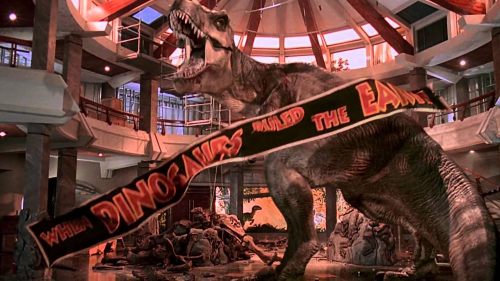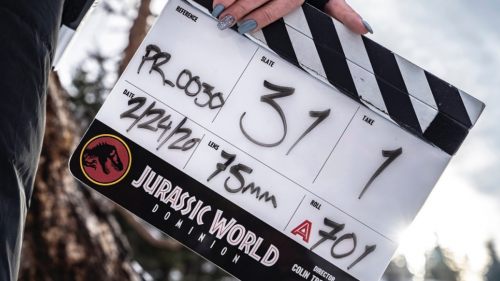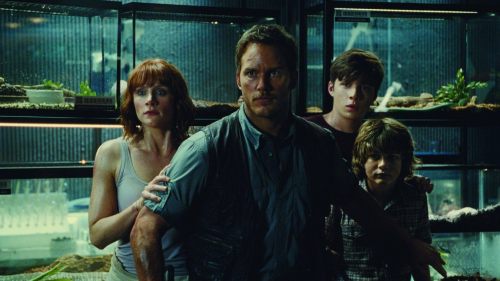JURASSIC WORLD: FALLEN KINGDOM And The Island Of Misfit Ideas
There’s nought quite as frustrating as a movie with good ideas and poor execution. Except, that is, a movie with good ideas and good execution, but with something missing between the two. Jurassic World: Fallen Kingdom is one of these movies, and dammit, I want to love it so much.
J.A. Bayona directs the hell out of Fallen Kingdom. He smartly creates setpieces heavy on terror, like the opening raid on Isla Nublar, and grandiose, Gothic horror, as in the climactic monster-in-the-house sequence. Bayona does next-level work lighting his dinosaurs, creating breathtaking effects with silhouettes, shadows, and reflections. The more epic sequences don’t work quite as well as the more intimate ones - the heavily-advertised volcanic eruption pales next to the subsequent encounter with a T-Rex in a shipping container - but generally speaking, Bayona nails it. Fallen Kingdom looks and feels like a movie, dammit - certainly in comparison to Jurassic World before it.
Fallen Kingdom also has good ideas at its core. Really! Much like its predecessor, which half-assed a clever premise of dinosaurs being over-commercialised to the point that the public got bored of them, Fallen Kingdom introduces a handful of really solid starting points, only to squander them at the scene-to-scene script level. The overarching story here actually advances the themes of the Jurassic series; it's cool not just because it’s got dinosaurs, but because it tips the franchise’s sci-fi conceits upside-down in interesting ways.
Most obvious is the notion of genetically engineering weaponised dinosaurs - something the franchise should have done long ago. Back in 1993, Jurassic Park's core conflict was between nature - “life finds a way” - and the human forces that sought to harness and exploit it for a buck. It’s shocking that earlier incarnations of InGen (even the evil one in The Lost World) limited themselves to entertainment-oriented goals - the arms trade is where the real money is, after all. What could possibly illustrate the order-versus-chaos conceit better than an attempt to train dinosaurs as living weapons? It’s a horrifying thought, and ties perfectly into Ian Malcolm’s monologues throughout the series.

The other side of that coin is protectionism, personified two-dimensionally by the character of Claire Dearing. The film doesn’t delve into the idea beyond pat assertions that “we can’t let [the dinosaurs] die,” but there’s an interesting debate to be had around the sci-fi ethics of letting Isla Nublar’s dinosaurs get wiped out by a volcano (admittedly, the most over-the-top way this issue could be raised). This is Prime Directive stuff, to reference another franchise that’s seen its ups and downs - what is our duty to life we created, and should we interfere to save it? Sadly, in Fallen Kingdom that debate takes place entirely offscreen, and before the movie even starts, leaving barely anything to be explored through action or character.
One super-strong element is the betrayal that Claire and Owen face midway through the film. Having spent and risked their lives engineering, training, and rescuing dinosaurs, they’re faced with the horrible reality that their work laid the foundations for arms dealers to turn them into weapons. That’s a major rug-pull for those characters - or at least, it should be. Unfortunately, it’s almost immediately forgotten, in the interests of action.
The protectionism-vs-weaponisation element of Fallen Kingdom feels oddly like an update of The Lost World - or even a direct followup to it. Spielberg’s 1997 film ends with park founder John Hammond calling for “preservation and isolation” of the now thriving dinosaurs on Isla Sorna. “These characters require our absence to survive, not our help,” he says, adding a knowing “life will find a way.” Both films feature a trip back to a ruined island (complete with custom vehicles!) and a double-cross that sees animals being taken back to the mainland before running amok. But in the newer film, the bad guys have more interesting ideas than just building an ill-conceived theme park attraction. Oooh, I wish this movie were better.
Fallen Kingdom’s most interesting idea, tragically, is also the idea it gives the shortest shrift. Young Maisie Lockwood, played by newcomer Isabella Sermon, has easily the most potential of any character in the film. Labeled the granddaughter of former Hammond colleague Benjamin Lockwood, she’s revealed mid-film as a secret clone of her mother, who was killed in a car crash years prior. There’s a lot to the notion of Lockwood using his company’s cloning technology for selfish, emotionally-driven ends, and to the story of a young clone discovering her concealed heritage. Human cloning is one of the great ethical questions facing the species as we advance in genetic technology, and it’s a natural extension of the questions posed by the original film.

Imagine if this film had been told from Maisie’s point of view - what a complex emotional story it could have been! But, alas: her story is buried underneath a mountain of dino-nonsense, and unforgivably, what should be a major character beat - the decision to set the dinosaurs free, out of a sense of connection to them - is almost thrown away offscreen.
The most galling thing about all this is that Fallen Kingdom would likely be a legitimately great film, had Jurassic World given it more to work with. Almost every problem with the film is inherited from the previous instalment (co-written and directed by this film's co-writer and self-styled trilogy overlord Colin Trevorrow). A sequel led by Claire and Owen was never going to be an attractive proposition, because Claire and Owen were never set up as charismatic or even interesting characters. They don’t contribute to the sequel's story; they lack chemistry together; we’re simply not interested in watching them.
Likewise, much of Fallen Kingdom hinges upon the relationship between Owen and his pet raptor Blue - something Jurassic World never earned. Fallen Kingdom does its best to retcon that connection in, via in-universe archival footage, but the fact remains: as depicted onscreen, Blue is just a kinda-smart dinosaur, no matter how much the dialogue and marketing insists otherwise. Her deus ex machina saving-the-day appearance at the end carries zero weight, just like Claire and Owen’s betrayal by their employers, because we didn't have a connection to these characters to begin with. How much better Fallen Kingdom would be if its predecessor had earned any audience sympathy for Claire, Owen, or Blue?
There’s a universe somewhere where Jurassic Park was followed up by a sequel merging the best elements of The Lost World and Fallen Kingdom. Where the park was never open; where InGen went down the hybridisation road in secret to recoup its losses via courting arms manufacturers; and where John Hammond, not the unevenly-accented stand-in Lockwood, cloned his daughter. Where a third film dealt with these highly-powered, fully-weaponised dinosaurs becoming self-aware, ending on a batshit down note promising a second, Planet of the Apes-like trilogy.
That universe - where the Jurassic Park franchise actually explored its sci-fi ideas - isn’t our universe. In our universe, we’ve got a bunch of ideas floating around inside flawed movies looking for something to connect with. But hey, a kid can dream.



